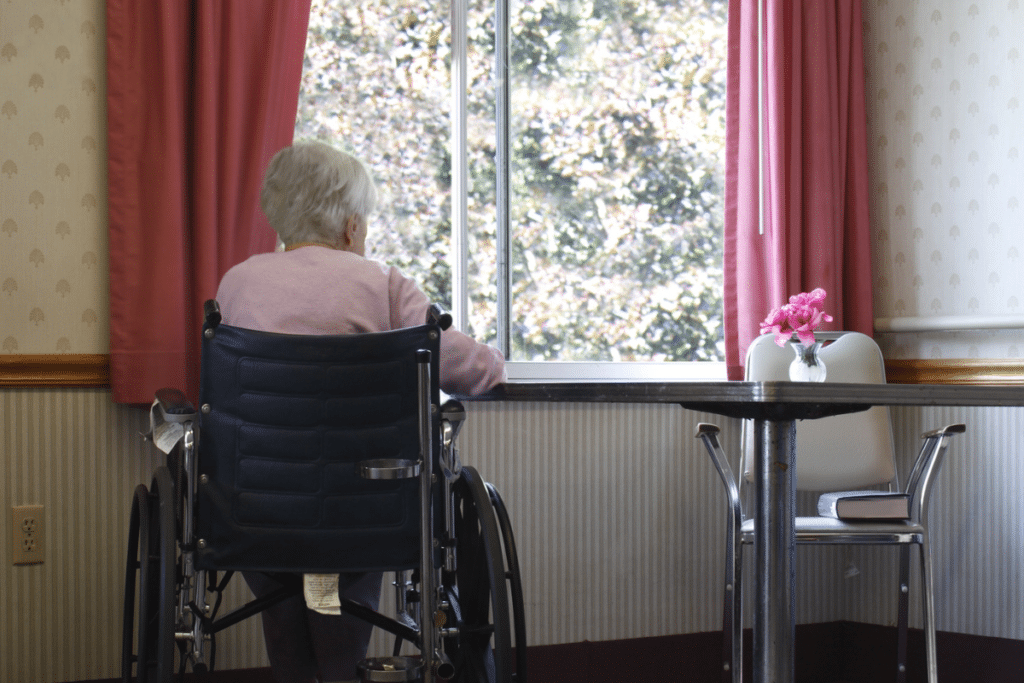California Nursing Home Abuse Lawyers
Elder abuse or neglect in nursing homes or skilled nursing facilities devastates victims and their families. When caregivers do not provide the proper standard of care, you can take legal action to hold them accountable and claim compensation for your suffering. A California elder abuse lawyer from Cutter Law is ready to fight for justice for you or your loved one.

Seniors residing in nursing homes, skilled nursing facilities, or residential care facilities for the elderly deserve to be treated with dignity and respect. They have the right to feel safe and protected where they live and to trust the people who care for them. Unfortunately, nursing home abuse and neglect are more prevalent than you may think. Seniors are vulnerable to exploitation and often try to hide abuse out of embarrassment or fear of being a burden.
Families who learn that a loved one was abused or neglected in a California nursing home have the right to take legal action and claim compensation for their suffering. An elder abuse lawyer in California can fight for you during this difficult time. Contact our team at Cutter Law to schedule a free and confidential consultation to learn how we can help your family get justice.
What Qualifies as Elder Abuse in California?
Under California law, skilled nursing facilities and nursing homes must provide a reasonable standard of care. These facilities fail to fulfill that duty if any of the following circumstances occur:
- Failure to provide proper hydration and nutrition
- Failure to maintain residents’ hygiene
- Denial of medical care
- Physical abuse
- Emotional abuse
- Sexual abuse
- Financial exploitation
- Abandonment or isolation
If nursing home staff and medical personnel fail to provide the proper care, residents often experience physical, emotional, and mental suffering. In some cases, caregivers physically abuse or mistreat residents who are vulnerable and unable to protect themselves. These actions are considered elder abuse in California when committed against someone 65 or older.

What Are the Signs of Elder Abuse?
While some signs of elder abuse are apparent, it’s not always obvious when an elderly person is the victim of abuse or neglect. If you suspect a loved one is being mistreated in a nursing home, look for these common signs of elder abuse:
- Open wounds
- Poor personal hygiene
- Dirty and untidy rooms
- Untreated bedsores
- Broken personal items
- Excessive, unexplained weight loss
- Isolation
- Unexplained changes in medication
- Use of restraints
- Falls
- Changes in personality
- Changes in financial patterns
You and your family are not alone. Contact your local adult protective services if you are a victim or suspect a loved one is being abused. A skilled California nursing home abuse lawyer can also help you get the support and monetary compensation you deserve.
Who can sue for elder abuse in California?
In California, different individuals can file a lawsuit for abuse or neglect of an elderly person living in a care facility. Among them are the following:
- The abused elder: The person who suffers the abuse can pursue compensation and bring an elder abuse lawsuit. However, many nursing home residents are not mobile or well enough to file a lawsuit independently and need help from family.
- Spouse of the abused person: A spouse can also file a lawsuit on behalf of the abused party.
- Family members: If a family member is the victim’s agent under a power of attorney or witnesses the abuse of their loved one, they may file an elder abuse lawsuit.
- Heirs of the abused elder: Unfortunately, some seniors in nursing homes or skilled nursing facilities die from mistreatment or neglect. When this happens, the person’s heir can take legal action.
If you’re unsure whether you qualify to bring a legal claim on behalf of a loved one abused in a nursing home, our attorneys can help. Schedule a confidential consultation with a trusted elder abuse lawyer in California to learn about your options.
Is There a Statute of Limitations for Elder Abuse in California?
Elder abuse or neglect cases are considered personal injury lawsuits. California law has a statute of limitations that imposes a deadline of two years from the incident date to bring a personal injury claim. For elder abuse statute of limitations, that period begins to run on the date the injury or abuse occurred.
If elder abuse results in the death of a loved one, your legal claim is considered a nursing home wrongful death lawsuit. In these cases, the statute of limitations starts on the date of death rather than the date of the abuse.
Because of these tight timeframes, speaking to a trusted attorney immediately if you suspect nursing home neglect or abuse is crucial. You must file the lawsuit within the statute of limitations to claim compensation for injuries, financial losses, and pain and suffering.

Who Is Liable for Elder Abuse in California?
Who you file suit against depends on the circumstances of the abuse. Your Cutter Law elder abuse lawyer will thoroughly investigate to determine who is responsible for elder neglect or abuse. Common parties who can be held liable include:
- The individual who committed the abuse or neglect
- The supervisor who failed to properly monitor employees
- The nursing home owner or operator who failed to recognize and prevent the abuse
Gathering evidence and documentation is vital when building a strong elder abuse case. Contact our team of nursing home abuse attorneys to protect your loved one and seek justice.
How Do You Report California Nursing Home Abuse?
If you suspect mistreatment, getting immediate help and protection for an abused elder is the first priority. After removing them from unsafe conditions, the next step is reporting the abuse to the appropriate authorities and community agencies. Here is who you can contact:
- The police: Call 911 to report the abuse to law enforcement immediately. The authorities will quickly respond and immediately get victims the care they need.
- California Adult Protective Services: This agency will investigate reported abuse in private homes, nursing homes, and other facilities and provide essential resources for victims and their families.
- California Long-Term Care Ombudsman: This agency specifically handles reports of abuse or neglect in residential care facilities for the elderly, adult daycare programs, and more.
- California Department of Public Health: You can make an official complaint with this agency about the nursing home or skilled nursing facility where your loved one was harmed.
Our elder abuse attorneys will share resources to support and guide you throughout the process. Remember, you are not alone in this struggle. Contact our team today to learn about your rights and find out what you can do to get justice for your loved one.
How Can Cutter Law Help Families with Elder Abuse Cases?
Cutter Law is dedicated to helping victims and their families with compassionate and skilled legal representation. Discovering elder abuse of a loved one is incredibly difficult and can leave you feeling helpless. Our highly qualified elder abuse attorneys specialize in these sensitive cases and will guide you through the legal process at every step of the way.
Some victims are reluctant to report abuse out of fear that no one will believe or understand them, which is why our team is ready to listen and ensure you or your family member is safe and treated with dignity.
Request a free case evaluation to learn more about California elder abuse laws and understand your legal options. Contact our Sacramento nursing home abuse lawyers or Oakland nursing home abuse lawyers today.
SETTLEMENT
$485,000
NURSING HOME ABUSE
Attorneys Brooks and Margot Cutter obtained a $485,000 settlement for elder abuse in a skilled nursing facility.
SETTLEMENT
$914,506.51
NURSING HOME ABUSE
Attorneys Brooks and Margot Cutter obtained a policy limits settlement of $914,506.51 for abuse of a dependent adult at a residential care facility.
Frequently Asked Questions (FAQs)
Our clients often have many questions about nursing home abuse lawsuits, such as those listed below. We are more than happy to answer any questions our clients have.
How long does it take to resolve nursing home neglect or abuse allegations?
That depends on the specific circumstances surrounding your case. Complex cases that require more witness and expert testimony can take longer to resolve. Some cases result in a nursing home abuse settlement, but others require a decision from the courts. We are committed to building the strongest possible case on your behalf, so we will not rush a case.
What are common causes of nursing home abuse or nursing home neglect?
Unfortunately, many nursing home and care home owners and operators care more about profits than about protecting patients. This could result in a lack of staff members, pushing staff to work beyond their capabilities; staff that isn’t adequately trained; staff that hasn’t undergone thorough background checks; outdated equipment; and inadequate supervision.
What is the “exploitation of an elderly person”?
Exploitation of an elderly person occurs when a person who is in a position of trust and confidence with the elderly person uses that position to gain a benefit from the elderly person. The person in a position of trust knows or should know that the elderly person does not have the capacity to give consent and uses that to deprive the vulnerable person of funds, assets, or property. Exploitation of an elderly person typically refers to financial exploitation, including funds, assets, or property.
Can you sue a nursing home?
Yes, in most situations. If the ownership or staff of the nursing home violated the law or was negligent in their care for nursing home residents, causing harm to a loved one, you can file a nursing home abuse lawsuit. Nursing homes are legally responsible for the care given to residents and if there is negligence, neglect, medical malpractice, or abuse on the part of the home, a personal injury, medical malpractice, or wrongful death lawsuit can be filed.
What is “nursing home binding arbitration”?
Some nursing homes require residents to sign a binding arbitration agreement, meaning that if harm comes to the resident the dispute must be resolved through binding arbitration rather than through the courts. An experienced law firm can help determine if you must go through binding arbitration or if you can file a lawsuit.
Testimonials
Schedule A Free Case Review
"*" indicates required fields
Our Office Locations
Sacramento Office
401 Watt Avenue Suite 100
Sacramento, CA 95864
Phone: 916-290-9400
Oakland Office
Cutter Law P.C.
1999 Harrison Street Suite 1400
Oakland, CA 94612








